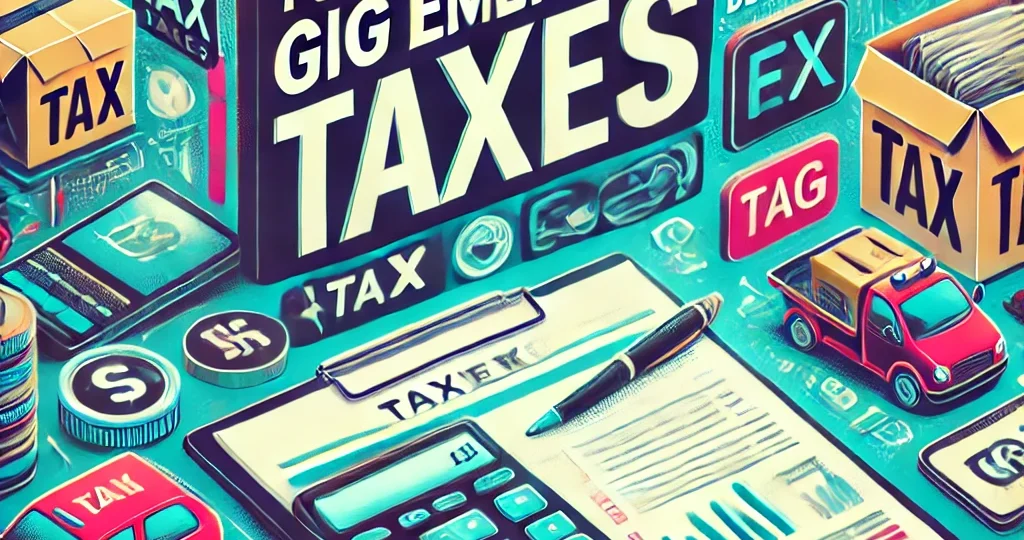The Best Way To Navigating Gig Economy Taxes
October 5, 2024 | by Jean Twizeyimana

My Adventure into the Gig Economy
Why I Jumped into the Gig Economy
Let’s dive into gig economy taxes! I plunged into the gig economy because I wanted more freedom in my work life. Starting my wonder-working time as a 9 to 5 guy felt like a straitjacket with their rigid hours that don’t work for my groove. I could call shots or projects in the gig economy, so I chose the one that best fit my skill set and was passionate about. Plus, it was a lifesaver in these unpredictable times to have a way to spread my income sources. Do you want to know what skills are on fire in the gig world? Then, view this list of in-demand gig economy skills.
The Flexibility and Opportunities
The mind-blowing flexibility is what had me. I could dictate when and where to work, which came in handy for balancing a job and a personal life. This freedom also allowed me to try new things, such as writing and graphic design, virtual assistance, and data entry.
| Gig Type | Hours/Week | Income/Week ($) |
|---|---|---|
| Writing | 10 | 300 |
| Graphic Design | 8 | 400 |
| Virtual Assistance | 5 | 150 |
| Data Entry | 7 | 210 |
This is to look into a regular week of mine doing gigs and making some cash. If you’re ready to start, here’s a step-by-step guide on creating your Upwork profile.
Freelancers love the gig economy like it’s a candy store. Almost every skill has its platform, and new gigs keep popping up. It’s ever-changing, so there’s always something new to absorb, which keeps things fresh, and I keep growing and learning. This is an excellent article on full-time gig work, too, if you’re considering doing it.
Handling gig economy taxes isn’t at all fun, but with the right strategy, it’s possible. The key is keeping tabs on earnings and expenses, which I will review in the next couple of sections.
Understanding Gig Economy Taxes
As a gig worker, figuring out taxes can be like a puzzle with missing pieces. It’s not so bad once you learn it, but what I’ve learned about being in the gig economy and taxes.
What You Need to Know About Gig Economy Taxes
Being a gig worker kind of sucks — you’re your boss, with its own set of tax rules. When the IRS classifies gig workers as self-employed, you’re responsible for reporting and paying your taxes. It’s income tax and self-employment tax (that’s Social Security and Medicare). I realized early on the importance of tracking every penny I make and dedicating it to it. Gig workers get their total earnings and are then responsible for setting aside money for taxes — which isn’t the same as a regular job where taxes are deducted from your paycheck. I then use a simple spreadsheet to track my income gigs and ensure I’m set for the upcoming tax season.
Key Differences from Traditional Employment Taxes
As I investigated my tax duties, the differences between gig economy taxes and regular job taxes became clear.
Self-Employment Tax: As a gig worker, I pay a self-employment tax of 15.3% on my net earnings. This breaks down to 12.4% for Social Security and 2.9% for Medicare. Regular employees split this cost with their employers, but gig workers must cover it.
Quarterly Estimated Taxes: Compared to those with taxes taken from their paychecks every paycheck, I have to pay estimated taxes every three months. It does this to avoid taxes owed to them that will result in penalties and interest. Here’s a quick rundown of the quarterly tax deadlines:
| Quarter | Payment Period | Due Date |
|---|---|---|
| 1st | Jan 1 – Mar 31 | April 15 |
| 2nd | Apr 1 – May 31 | June 15 |
| 3rd | Jun 1 – Aug 31 | September 15 |
| 4th | Sep 1 – Dec 31 | January 15 (following year) |
- Deductible Business Expenses: One of the perks of gig work is deducting business expenses, which can lower your taxable income. Here are some standard deductions I use.
- Home office costs
- Travel and mileage
- Supplies and gear
- Internet and phone bills
If I can learn to handle the twists and turns of gig economy taxes by understanding these key differences and being organized, I won’t panic. To learn more of our tips on managing the work, look into our articles on time management for microtasks and full-time gig work.
Keeping Track of Earnings and Expenses
Juggling flaming swords regarding gig economy taxes, but a good setup for tracking your earnings and expenses takes a lot away. And here’s my no B.S. way to stay organized.
My System for Tracking Income
I employ a combination of good old-fashioned spreadsheets and digital tools to track where my money is going. This combo has helped me track what I make from ‘freelance’ writing, ride-sharing, and other gig platforms. I usually update my records weekly to avoid panicking at the last minute.
| Month | Income Source | Amount ($) |
|---|---|---|
| Jan | Freelance Writing | 1,200 |
| Jan | Ride-Sharing | 800 |
| Feb | Freelance Writing | 1,500 |
| Feb | Ride-Sharing | 900 |
Keeping things tidy lets me see my earnings at a glance and ensures I don’t miss any income when it’s time to file taxes. If you’re wondering what income sources to track, check out our guide on in-demand gig economy skills.
Essential Expenses to Keep an Eye On
Tracking expenses is just as crucial as tracking income. Here are some critical expenses I monitor to squeeze out every possible deduction:
- Supplies and Equipment: Anything I buy specifically for my gigs, such as a new laptop and software subscriptions.
- Travel and Mileage: I record my Mileage in detail, just for ride-sharing or some other gig where you’re driving.
- Home Office: Rent, utilities, and Internet if I dedicate a room in my house to work.
- Professional Services: Hiring an accountant or other service related to my gigs.
| Expense Type | Monthly Cost ($) |
|---|---|
| Supplies & Equipment | 50 |
| Travel & Mileage | 100 |
| Home Office | 200 |
| Professional Services | 75 |
I know I don’t miss any valuable deductions by monitoring these expenses. Enjoy more ways to manage your gig work efficiently. Please read our article on time management for microtasks. Are you ready to make the gig work full-time? There are extra strategies and tips for the full-time gig work guide.
The secret to handling gig economy taxes without going crazy is simply staying organized with income and expenses.
Filing Taxes as a Gig Worker
Taxing as a gig worker can be a headache but not a nightmare if you’re prepared, even a little. I’m sharing how I handle tax season and the forms and deadlines you should know.
How I Get Ready for Tax Season
Getting ready for tax season is all about staying on top of things. Here’s my game plan:
- Collect All Income Records: I save papers showing how much I earn on different gig platforms. This includes payment statements, invoices, and any 1099 forms I get.
- Track Expenses: Throughout the year, I keep tabs on all my business-related expenses. These include home office supplies, Internet bills, and anything related to my gig work.
- Use a Spreadsheet: I keep track of all my income and expenses in a straightforward spreadsheet. It also helps me see a ‘big picture’ of both my total earnings and deductions.
- Estimate Quarterly Taxes: Being a gig worker, I have to pay estimated quarterly taxes. I use my income records to determine how much I owe each time.
Important Forms and Deadlines
Knowing which forms to fill out and when they’re due is a big deal. Here are the essential forms and deadlines I keep track of:
| Form | Purpose | Deadline |
|---|---|---|
| 1099-NEC | Reports income from clients or platforms | January 31 |
| Schedule C (Form 1040) | Reports income and expenses from self-employment | April 15 |
| Form 1040-ES | Used to pay estimated quarterly taxes | April 15, June 15, September 15, January 15 |
| Schedule SE (Form 1040) | Calculates self-employment tax | April 15 |
For more tips on managing your gig economy earnings, check out our guide on time management for microtasks.
Filing taxes as a gig worker isn’t as tough as it seems, especially if you stay organized throughout the year. You can handle gig economy taxes like a pro by keeping good records and knowing your deadlines. If you’re thinking about making gig work your full-time gig, read more about full-time gig work.
Deductions and Credits
You can get tax headaches if you’re hustling in the gig economy. But don’t sweat it! If you are curious about what deductions and credits you could claim to save you a lot of cash, starting your research is a good idea. And so, let’s begin with a simple guide to help you keep more of your hard-earned money.
Common Deductions for Gig Workers
As a gig worker, you can deduct many expenses to reduce the income subject to tax. Unlike many deductions, however, these have to be tracked to help you pay less in taxes.
- Home Office Deduction: Do you have a corner of your home where you work? You can deduct part of your rent, mortgage, utilities, and other home expenses.
- Mileage and Vehicle Expenses: Do you drive for work? The mileage or actual vehicle costs (gas, repairs, maintenance) are deductible. Keep just a detailed log of those work-related miles.
- Supplies and Equipment: Did you buy a laptop, printer, or office supplies for your gig? Deduct those costs.
- Internet and Phone Bills: Do you use your phone and your internet? Cut out some of those bills. Save everything back to your claims.
| Expense Type | Deductible Amount |
|---|---|
| Home Office | Proportional to space used for work |
| Mileage and Vehicle | Standard mileage rate or actual expenses |
| Supplies and Equipment | Full cost |
| Internet and Phone | Proportional to work use |
Credits That Can Save You Money
Besides deductions, tax credits can also cut your tax bill. Credits directly reduce the tax you owe, which can be even better than deductions.
1. Earned Income Tax Credit (EITC): If your income is below a certain level, you might qualify for the EITC, which can give you a nice tax break.
2. Saver’s Credit: Contributing to a retirement plan like an IRA? You might be eligible for the Saver’s Credit, which rewards you for saving for the future.
3. Health Insurance Premium Tax Credit: Bought health insurance through the Health Insurance Marketplace? You might get this credit based on your income.
| Credit Type | Eligibility Criteria |
|---|---|
| Earned Income Tax Credit (EITC) | Income below threshold |
| Saver’s Credit | Contributions to retirement plan |
| Health Insurance Premium Tax Credit | Purchase through Marketplace |
Knowing and using these deductions and credits can cut your tax bill and keep more of your money. For more tips on managing gig economy taxes, check out our articles on in-demand gig economy skills and time management for microtasks.
Tips for Staying Organized Year-Round
Keeping your gig economy taxes in check doesn’t have to be a headache. Here’s how I stay on top of things with some handy tools and intelligent strategies.
Tools and Strategies I Use
To keep everything in order for tax season, I lean on a few trusty tools and methods.
Digital Tools
- Expense Tracking apps are lifesavers. I never have to ask where my money is going because these apps automatically log and categorize every gig-related expense.
- Income Tracking Software: This piece of software syncs my earnings with all the platforms I work on, so I get a real-time snapshot of what I have made.
- Digital Calendars: I also schedule regular check-ins to monitor my income and expenses, so I don’t miss anything.
Strategies
- Weekly Reviews: I find time to review my weekly income and expenses. It helps me catch mistakes early.
- Separate Accounts: I keep my personal and gig economy earnings in separate bank accounts, so tracking business expenses has always been challenging.
- Receipts and Documentation: I store digital copies of all my receipts and important documents in the cloud. This helps immensely during tax season.
Avoiding Common Pitfalls and Mistakes
Handling gig economy taxes can be tricky. Here are some common pitfalls and how to dodge them:
- Not Tracking All Income: Again, this is, of course, reporting all your earnings and avoiding putting yourself in hot water with the IRS. If I owe you money, I always make sure to write it down, whatever the amount.
- Ignoring Small Expenses: Those little expenses add up. I’ll pay attention to each mile I drive, every task completed, and how many supplies are in the office.
- Missing Deadlines: Filing yourself can get you in trouble. I also discovered a way to type in all my essential dates and set reminders for how often I should file and pay quarterly taxes.
Common Pitfalls and How to Avoid Them
| Pitfall | How to Avoid |
|---|---|
| Not Recording All Income | Use income tracking software |
| Ignoring Small Expenses | Track every expense, even small ones |
| Missing Deadlines | Set calendar reminders for tax deadlines |
Conclusion
Using these tools and strategies keeps my gig economy taxes in check. If you’d like a few more tips on how to manage your gig work, take a look at our article on time management for microtasks. Organizing my finances helps me avoid common mistakes and makes Tax Season go by as smoothly as possible.
RELATED POSTS
View all



